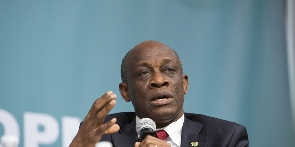- Home - News
- TWI News | TV
- Polls
- Year In Review
- News Archive
- Crime & Punishment
- Politics
- Regional
- Editorial
- Health
- Ghanaians Abroad
- Tabloid
- Africa
- Religion
- Election 2020
- Coronavirus
- News Videos | TV
- Photo Archives
- News Headlines
- Press Release
Business News of Thursday, 4 December 2008
Source: Daily Guide
Ghana’s export volume drops
The export volume of Ghana is expected to fall in 2009 following the ongoing economic recession that has hit the world’s major economies, Private Enterprise Foundation (PEF) has predicted.
“Since most of the industries in US and Europe are collapsing, the demand for our export commodities is expected to be lower in 2009,” PEF explained.
In the same year, the cedi is expected to depreciate highly due to the imbalances between export and import.
PEF further predicted that the volumes of financial flows for investment would reduce drastically in the coming year.
At the end of 2008, the cedi depreciated by 15.8 percent against the US dollar, 14 percent against the Euro and 6.2 percent against the British Pound. Comparable figures as at September 2007 are five percent, 17.5 percent and 6.9 percent respectively.
PEF warned that “Ghanaians should expect some level of depreciation of the cedi next year,” stating that the depreciation could be higher than the 2008 figure.
Consequently, a consultant to PEF, Felix Tettey-Fio suggested that “we need to look at value addition and regional trade.
“Most of the countries in West Africa are not currently affected by the ongoing economic recession so Ghana should take advantage of this opportunity to export to these countries,” Mr Tettey-Fio, stated.
The macroeconomic performance of Ghana since the beginning of the year indicates that inflation rose from 12.8 percent in January to 18.4 percent at the end of June with a steady decline to 17.3 percent at the end of October.
With a budget deficit of 4.2 percent of Gross Domestic Product, the country’s international reserve was pegged at $2270 million. This amount was equivalent to two-three months of the country’s import cover.
During the year, prime rate increased from 12.5 percent to 17 percent currently. The 91-day Treasury Bill has also risen steadily at the end of October 2008, with the average base rates of the banks rising from 18.77 percent at the end of December 2007 to about 25.6 percent currently.
With regard to the external sector of the economy, export of cocoa beans and products was estimated at $1,161 million in 2008 compared to $910.8 million last year. Gold exports also rose from $1247.4 million in 2007 to $1,751 million this year.
A total of merchandise imports for this year was $7514 million. Out of this amount, oil import was $1,706.8 million compared to $1,523.9 million in 2007. Non-oil imports, on the other hand, stood at $5,807.2 million, representing 38 percent growth on annual basis.
With regard to the banking sector, the ratio of non-performing loans has reduced from 8.7 percent in 2007 to 7.6 percent in 2008. This means that loan defaulters are reducing gradually.
This year being an election year, the government will not be presenting the annual national budget to Parliament.
PEF, an umbrella organization representing the private sector in Ghana yesterday held a round-table discussion in Accra to solicit views and suggestions that would help prepare a final position paper on private sector inputs into the 2009 Budget and Economic Policy Statement. The inputs would be presented to the new Government early 2009.










